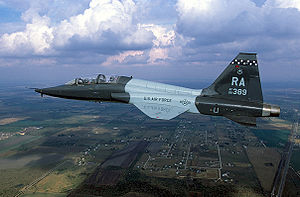
The Northrop T-38 Talon is a two-seat, twin-engined supersonic jet trainer. It was the world's first supersonic trainer and is also the most produced. The T-38 remains in service as of 2017 in several air forces.
The United States Air Force (USAF) operates the most T-38s. In addition to training USAF pilots, the T-38 is used by NASA. The U.S. Naval Test Pilot School is the principal US Navy operator (other T-38s were previously used as USN aggressor aircraft until replaced by the similar Northrop F-5 Tiger II). Pilots of other NATO nations fly the T-38 in joint training programs with USAF pilots.
As of 2015, the T-38 has been in service for over 50 years with its original operator, the United States Air Force.
In 1952 Northrop began work on a fighter project, the Fang, with shoulder-mounted delta wing and a single engine. Then in 1953, representatives from General Electric Aviation's newly created Small Aircraft Engine Department showed Northrop a relatively tiny engine (around 400Â lb installed wt) capable of 2,500Â lb of thrust, and Northrop VP-Engineering Edgar Schmued saw the possibility of reversing the trend toward the large fighters. Schmued and chief engineer Welko Gasich decided on a small twin-engine "hot-rod" fighter, the N-156. Northrop began its N-156 project in 1954, aiming for a small supersonic fighter jet capable of operating from the US Navy's escort carriers. However, when the Navy chose not to pursue equipping its fleets in that fashion, Northrop continued the N-156 design using in-house funding, recasting it as a lightweight fighter (dubbed N-156F) and aimed at the export market.